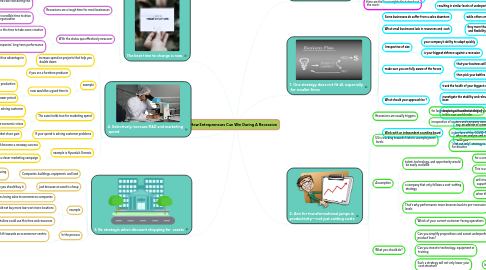
1. 3. Be strategic when discount shopping for assets
1.1. Companies, buildings, equipment, and land
1.1.1. all of this become cheaper to acquire during a recession
1.2. just because an asset is cheap
1.2.1. does not mean you should buy it
1.3. example
1.3.1. retail stores losing sales to ecommerce companies
1.3.2. should not buy more low-cost store locations
1.3.3. such retailers could use this time and resources
1.3.3.1. to invest in upgrading their technology stack and digital talent
1.4. In the process
1.4.1. they'll accelerate their shift towards an ecommerce-centric business model
2. 4. Selectively increase R&D and marketing spend
2.1. increase spend on projects that help you double down
2.1.1. on your relevant competitive advantage in the new world order
2.2. example
2.2.1. if you are a furniture producer
2.2.2. now would be a good time to
2.2.2.1. explore new material types and production equipment
2.2.2.2. that can help deliver lower priced
2.2.2.2.1. but fashionably made pieces of furniture
2.3. The same holds true for marketing spend
2.3.1. If it is not relevant to solving customer problems
2.3.2. from the lens of the economic crises
2.3.2.1. do not put marketing dollars behind it
2.4. If your spend is solving customer problems
2.4.1. double down quickly for market share gain
2.5. example is Hyundai’s Genesis
2.5.1. which became a runaway success
2.5.1.1. during the financial crises (2008-09)
2.5.2. thanks to a clever marketing campaign
2.5.2.1. and a sharp positioning towards ‘accessible luxury’
3. The best time to change is now
3.1. Recessions are a tough time for most businesses
3.1.1. and many companies will fold during this period
3.1.2. however, also an incredible time to drive change in your organization
3.1.2.1. for the better
3.2. With the status quo effectively now over
3.2.1. we should use this time to take some creative risks
3.2.2. and take our companies’ long-term performance up a notch
4. Benefits of Mind Mapping pdf Guide --->
5. The current COVID-19 Scenario
5.1. COVID-19 pandemic ended a record 11-year bull run of the U.S. stock market
5.1.1. coupled with an oil price crash instigated by Saudi Arabia and Russia
5.1.2. has all the signs of an imminent global recession
5.2. experts are predicting a global contraction
5.2.1. between 6 months up to 2 years
5.2.2. which will drive global doubling in bankruptcy & unemployment rates
5.3. Here are the four insights that stood out the most:
6. 1. One strategy does not fit all, especially for smaller firms
6.1. Given the current news cycle
6.1.1. it is easy to imagine that a recession hits all businesses equally
6.1.2. resulting in similar levels of underperformance
6.2. Some businesses do suffer from a sales downturn
6.2.1. while others end up with a sharp increase in sales
6.3. What small businesses lack in resources and cash
6.3.1. they more than make up for in terms of speed and flexibility
6.4. Irrespective of size
6.4.1. your company’s ability to adapt quickly
6.4.2. is your biggest defence against a recession
6.5. make sure you are fully aware of the forces
6.5.1. that your business will be exposed to
6.5.2. then pick your battles strategically
6.6. What should your approach be ?
6.6.1. track the health of your biggest customers
6.6.2. investigate the stability and relevance of your existing supplier base
6.6.3. deepen your understanding of your company’s competitive advantage in this new world order
6.7. Work with an independent sounding board
6.7.1. say, an advisor or a mentor
6.7.2. who can analyse and co-create your new strategy with you
7. 2. Aim for transformational jumps in productivity—not just cutting costs
7.1. Recessions are usually triggers
7.1.1. for large-scale layoffs and cost cutting
7.1.2. irrespective of sectors and company sizes
7.2. US is tracking towards historic unemployment levels
7.2.1. in the face of the COVID-19 lockdown
7.2.2. "cost cut only" strategy is a recipe for disaster
7.3. Assumption
7.3.1. talent, technology, and opportunity would be easily available
7.3.1.1. for a company once the recession is over
7.3.1.2. This is usually never the case
7.3.2. a company that only follows a cost-cutting strategy
7.3.2.1. will struggle to regain capabilities and capacity
7.3.2.2. when the economy returns to normal
7.3.3. That's why performance never bounces back to pre-recession levels
7.4. What you should do?
7.4.1. Which of your current customer-facing operations
7.4.1.1. can be simplified or digitized to deliver products and services faster, cheaper, and better?
7.4.2. Can you simplify propositions and sunset underperforming product lines?
7.4.3. Can you invest in technology, equipment or training
7.4.3.1. that will improve performance reasonably quickly?
7.4.4. Such a strategy will not only lower your cost structure
7.4.4.1. but will help you leapfrog your competition
7.4.5. During this process
7.4.5.1. you will need to let go of some employees who you no longer need
